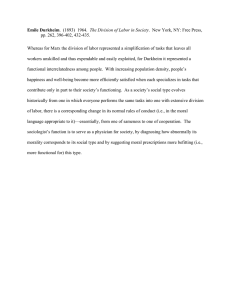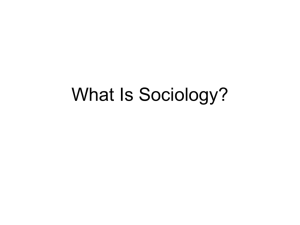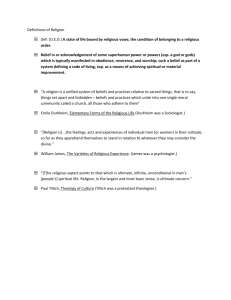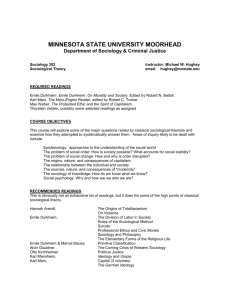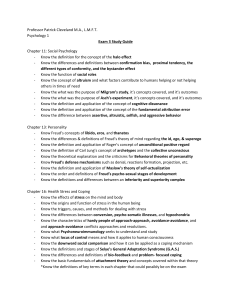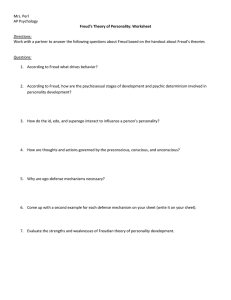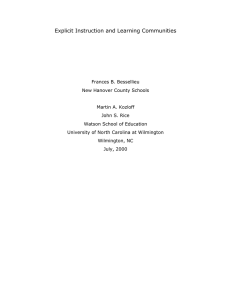Paul G. Schervish Sociology 715.01 Department
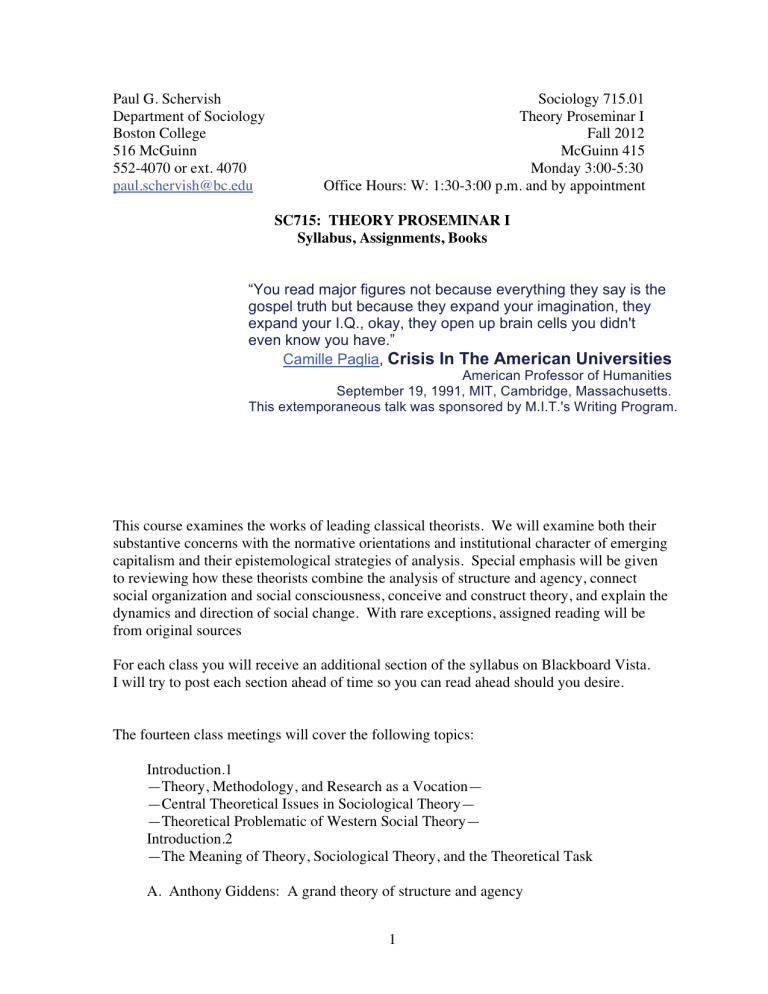
Paul G. Schervish Sociology 715.01
Boston College
516 McGuinn
552-4070 or ext. 4070 paul.schervish@bc.edu
Fall 2012
McGuinn 415
Monday 3:00-5:30
Office Hours: W: 1:30-3:00 p.m. and by appointment
SC715: THEORY PROSEMINAR I
Syllabus, Assignments, Books
“You read major figures not because everything they say is the gospel truth but because they expand your imagination, they expand your I.Q., okay, they open up brain cells you didn't even know you have.”
Camille Paglia ,
Crisis In The American Universities
American Professor of Humanities
September 19, 1991, MIT, Cambridge, Massachusetts.
This extemporaneous talk was sponsored by M.I.T.'s Writing Program.
This course examines the works of leading classical theorists. We will examine both their substantive concerns with the normative orientations and institutional character of emerging capitalism and their epistemological strategies of analysis. Special emphasis will be given to reviewing how these theorists combine the analysis of structure and agency, connect social organization and social consciousness, conceive and construct theory, and explain the dynamics and direction of social change. With rare exceptions, assigned reading will be from original sources
For each class you will receive an additional section of the syllabus on Blackboard Vista.
I will try to post each section ahead of time so you can read ahead should you desire.
The fourteen class meetings will cover the following topics:
Introduction.1
—Theory, Methodology, and Research as a Vocation—
—Central Theoretical Issues in Sociological Theory—
—Theoretical Problematic of Western Social Theory—
Introduction.2
—The Meaning of Theory, Sociological Theory, and the Theoretical Task
A. Anthony Giddens: A grand theory of structure and agency
1
2
B. Adam Smith: social-psychology and institutional forms of the new order
C Georg Wilhelm Friedrich Hegel and Ludwig Feuerbach; philosophical and historical dialectics of culture, state (social formation of society), and destiny
D1, D2. Karl Marx: philosophy, social-psychology, political-economy, and the future
E. Friedrich Nietzsche: leitmotifs (leading thematic motives), leitworten (leading thematic words), passion, the irrational, and reason making individuals “masters of their passion” (Walter Kaufmann).
F. Georg Simmel: culture, social interaction, and personality
G1, G2. Emile Durkheim: method, culture, emotion, and modernity
H1, H2. Max Weber: vocation of politics, science, and economics
I. Harriet Martineau: daily life, observation, induction, and gender
J. Alexis de Tocqueville and Robert Michels: the individual, the state, and civil society
K. Veblen: the spiritual legacy and organizational pillar of capitalism
L. DuBois: urban life, social capital, and race
OR
M.
Freud: dialectics of the psyche, culture, and the methodology of social science
N.
Bernstein and Luxemburg: reform or revolution?]
For each section of the course I will distribute a list of required and recommended readings. I will also provide one or two questions each week in the style of the questions asked on the theory comprehensive exam. You will be expected to answer a total of 7 questions of your choice—you may choose to do two papers from the same section. Please try to keep your answers to five pages single spaced. Write the text on the two-thirds of the page (that is covering four inches of the paper in 12 point Times--as is this paragraph). This way, I have room to write some comments. Your arguments developed in such papers will be incorporated into the discussion each week. Therefore papers must be handed in at the class for which the proposed question was designated. Late papers will be lowered 1/3 grade.
The course grade will be based on the evaluations of these paper and class attendance, which is required.
3
It sometimes happens that students wish to develop and answer a question of their own making. This is fine as long as the paper notes the question and uses and cites the assigned texts.
Another innovation is that if you wish to write your paper and use it (and whatever additional material you desire) to lead the discussion for a large portion of a class, let me know. Such preparation and class responsibility will count for two papers. Topics available for this are: Simmel, Durkheim (part 2), Weber (part 2), Freud. If the class would prefer to study Nietzsche and not do Dubois, two students may work together to develop the required texts, question, and outline for subsequent class presentation. This will count as two papers for each of the two students.
All papers must be typed. Grammar and spelling will be evaluated along with the content of the papers.
Familiarize yourself with the University rules on plagiarism; they will be strictly enforced
(see below).
There will be a copying charge of 3cents/page to cover the cost of for some few photocopied materials that will be passed out in class.
The following books are this year NOT available in the bookstore. As I wrote, you will do better to purchase your books on line or, if you wish, obtain copies from the library.
[Not available this year in bookstore] Durkheim, Emile. The Division of Labor in Society .
Free Press: New York. 1984.
Durkheim, Emile. The Elementary Forms of the Religious Life . Karen Fields (trans.). Free
Press: New York. 1995.
Durkheim, Emile. The Rules of the Sociological Method . Free Press: New York. 1982.
Durkheim, Emile. Suicide . Free Press: New York. 1951.
Feuerbach, Ludwig. The Essence of Christianity . Harper Torchbooks: New York. 1957.
Freud, Sigmund. The Freud Reader . Norton. .
Freud, Sigmund. Psychology and the Analysis of the Ego . Norton.
Giddens, Anthony. The Constitution of Society . University of California Press: Berkeley.
1984.
4
[Please order on your own, but don’t worry if you find it out of print. Let me know and I will provide appropriate sections on BBVista reserve.] Martineau, Harriet. How to Observe
Morals and Manners . Transaction: New Brunswick. 1989.
Marx, Karl. Karl Marx Selected Writings . David McLellan (Ed.). Oxford University Press:
Oxford. 1977.
Ritzer, George, Classical Sociological Theory . Third Edition. McGraw Hill: New York.
Any edition.
Simmel, George. Georg Simmel on Individuality and Social Forms . Levine, Donald N.
(Ed.) University of Chicago Press: Chicago. 1971.
Smith, Adam. The Essential Adam Smith . Robert L. Heilbroner (Ed.). Norton: New York.
1986.
Tocqueville, Alexis de. Democracy in America . George Lawrence, (Trans.). Harper
Perennial: New York. 1969.
Weber, Max. Economy and Society . 2 vols. University of California Press: Berkeley.
1978.
Weber, Max. The Protestant Ethic and the Spirit of Capitalism . Stephen Kalberg (Intro. and trans.) Roxbury: Los Angeles. 2002.
Freud, Sigmund. The Freud Reader . Norton. .
Occasional additional readings will be designated on the assignment sheets for each section.
Copies will be made available if they are not posted on B/Vista.
[If we do a section of Nietzche, you then should order The Portable Nietzsche (Kaufman) from internet source.
5
Boston College Academic Integrity Policy and Procedures
The pursuit of knowledge can proceed only when scholars take responsibility and receive credit for their work. Recognition of individual contributions to knowledge and of the intellectual property of others builds trust within the University and encourages the sharing of ideas that is essential to scholarship. Similarly, the educational process requires that individuals present their own ideas and insights for evaluation, critique, and eventual reformulation. Presentation of others' work as one's own is not only intellectual dishonesty, but also undermines the educational process.
Standards
Academic integrity is violated by any dishonest act which is committed in an academic context including, but not restricted to the following:
Cheating is the fraudulent or dishonest presentation of work. Cheating includes but is not limited to:
* the use or attempted use of unauthorized aids in examinations or other academic exercises submitted for evaluation;
* fabrication, falsification, or misrepresentation of data, results, sources for papers or reports, or in clinical practice, as in reporting experiments, measurements, statistical analyses, tests, or other studies never performed; manipulating or altering data or other manifestations of research to achieve a desired result; selective reporting, including the deliberate suppression of conflicting or unwanted data;
* falsification of papers, official records, or reports;
* copying from another student's work;
* actions that destroy or alter the work of another student;
* unauthorized cooperation in completing assignments or during an examination;
* the use of purchased essays or term papers, or of purchased preparatory research for such papers;
* submission of the same written work in more than one course without prior written approval from the instructors involved;
* dishonesty in requests for make-up exams, for extensions of deadlines for submitting papers, and in any other matter relating to a course.
Plagiarism is the act of taking the words, ideas, data, illustrations, or statements of another person or source, and presenting them as one's own. Each student is responsible for learning and using proper methods of paraphrasing and footnoting, quotation, and other forms of citation, to ensure that the original author, speaker, illustrator, or source of the material used is clearly acknowledged.
Other breaches of academic integrity include:
6
* the misrepresentation of one's own or another's identity for academic purposes;
* the misrepresentation of material facts or circumstances in relation to examinations, papers, or other evaluative activities;
* the sale of papers, essays, or research for fraudulent use;
* the alteration or falsification of official University records;
* the unauthorized use of University academic facilities or equipment, including computer accounts and files;
* the unauthorized recording, sale, purchase, or use of academic lectures, academic computer software, or other instructional materials;
* the expropriation or abuse of ideas and preliminary data obtained during the process of editorial or peer review of work submitted to journals, or in proposals for funding by agency panels or by internal University committees;
* the expropriation and/or inappropriate dissemination of personally-identifying human subject data;
* the unauthorized removal, mutilation, or deliberate concealment of materials in
University libraries, media, or academic resource centers.
Collusion is defined as assistance or an attempt to assist another student in an act of academic dishonesty. Collusion is distinct from collaborative learning, which may be a valuable component of students' scholarly development. Acceptable levels of collaboration vary in different courses, and students are expected to consult with their instructor if they are uncertain whether their cooperative activities are acceptable.
Promoting Academic Integrity: Roles of Community Members
Student Roles in Maintaining Academic Integrity
Students have a responsibility to maintain high standards of academic integrity in their own work, and thereby to maintain the integrity of their degree. It is their responsibility to be familiar with, and understand, the University policy on academic integrity.
Students who become aware of a violation of academic integrity by a fellow student should respond in one of the following ways:
* Students may discuss their concerns with the student whom they suspect of a violation. Direct contact by another student may be the best means of resolving the problem. Repeated demonstration of student concern for academic integrity will in the long run build a peer-regulated community.
7
* If the incident is a major violation or part of a repeated pattern of violations, students should bring their concerns to the attention of the instructor, or to the appropriate department chairperson or associate dean. Suspected violations by students reported to members of the faculty or to an associate dean will be handled according to the procedures set forth below.
Students who have serious concern that a faculty member is not living up to his or her responsibility to safeguard and promote academic integrity should speak with the faculty member directly, or should bring their concern to the attention of the department chairperson or associate dean.
Faculty Roles in Fostering Academic Integrity
Faculty members should provide students with a positive environment for learning and intellectual growth and, by their words and actions, promote conditions that foster academic integrity.
Faculty should be concerned about the impact of their behavior on students. Students are sensitive to messages communicated in informal discussions and in casual faculty remarks about personal decisions and value judgments. Students are perhaps most sensitive to how responsibly faculty members fulfill their obligations to them in the careful preparation of classes, in the serious evaluation of student achievement, and in their genuine interest in and availability to students.
Faculty should promote academic integrity in the following specific ways:
* At the beginning of each course, instructors should discuss academic integrity in order to promote an ongoing dialogue about academic integrity and to set the tone and establish guidelines for academic integrity within the context of the course, e.g., the extent to which collaborative work is appropriate. Where relevant, instructors should discuss why, when, and how students must cite sources in their written work.
* Instructors should provide students with a written syllabus that states course requirements and, when available, examination dates and times.
* Instructors are encouraged to prepare new examinations and assignments where appropriate each semester in order to ensure that no student obtains an unfair advantage over his or her classmates by reviewing exams or assignments from prior semesters. If previous examinations are available to some students, faculty members should insure that all students in the course have similar access. Course examinations should be designed to minimize the possibility of cheating, and course paper assignments should be designed to minimize the possibility of plagiarism.
* Proctors should be present at all examinations, including the final examination, and should provide students with an environment that encourages honesty and prevents dishonesty.
* Faculty should be careful to respect students' intellectual property and the confidentiality of student academic information.
* Assignment of grades, which is the sole responsibility of the instructor, should be awarded in a manner fair to all students.
8
